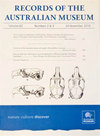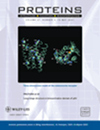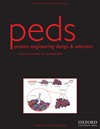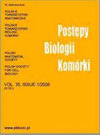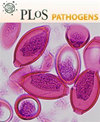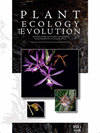BIOCHEMICAL SYSTEMATICS AND ECOLOGY
SCI/SCIE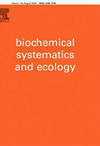
- 雜志名稱:生化系統(tǒng)學(xué)和生態(tài)學(xué)
- 簡稱:BIOCHEM SYST ECOL
- 期刊ISSN:0305-1978
- 大類研究方向:生物
- 影響因子:1.127
- 數(shù)據(jù)庫類型:SCI/SCIE
- 是否OA:No
- 出版地:ENGLAND
- 年文章數(shù):109
- 小類研究方向:生物-生化與分子生物學(xué)
- 審稿速度:約3.8個月
- 平均錄用比例:約50%
官方網(wǎng)站:http://www.elsevier.com/wps/find/journaldescription.cws_home/364/description#description
投稿網(wǎng)址:http://ees.elsevier.com/bse/
BIOCHEMICAL SYSTEMATICS AND ECOLOGY
英文簡介Biochemical Systematics and Ecology is devoted to the publication of original papers and reviews, both submitted and invited, in two subject areas: I) the application of biochemistry to problems relating to systematic biology of organisms (biochemical systematics); II) the role of biochemistry in interactions between organisms or between an organism and its environment (biochemical ecology).In the Biochemical Systematics subject area, comparative studies of the distribution of (secondary) metabolites within a wider taxon (e.g. genus or family) are welcome. Comparative studies, encompassing multiple accessions of each of the taxa within their distribution are particularly encouraged. Welcome are also studies combining classical chemosystematic studies (such as comparative HPLC-MS or GC-MS investigations) with (macro-) molecular phylogenetic studies. Studies that involve the comparative use of compounds to help differentiate among species such as adulterants or substitutes that illustrate the applied use of chemosystematics are welcome. In contrast, studies solely employing macromolecular phylogenetic techniques (gene sequences, RAPD studies etc.) will be considered out of scope. Discouraged are manuscripts that report known or new compounds from a single source taxon without addressing a systematic hypothesis. Also considered out of scope are studies using outdated and hard to reproduce macromolecular techniques such as RAPDs in combination with standard chemosystematic techniques such as GC-FID and GC-MS.In the Biochemical Ecology subject area, studies addressing the role compounds play in the ecology of the organisms producing them are invited. Moreover, manuscripts that address hypothesis associated with the influence of factors such as altitude, geography, and seasonal variation on the expression of primary and secondary metabolites are encouraged.Research papers should generally represent a complete investigation and not preliminary data. Preliminary reports will only be considered where findings are of sufficient interest to justify rapid publication. New Source Reports will only be considered in cases where a significant chemosystematic or ecological finding is reported. New Source Reports have to be written in a standard format
BIOCHEMICAL SYSTEMATICS AND ECOLOGY
中文簡介《生物化學(xué)系統(tǒng)學(xué)與生態(tài)學(xué)》致力于發(fā)表提交和邀請的兩個學(xué)科領(lǐng)域的原始論文和評論:1)生物化學(xué)在與生物系統(tǒng)生物學(xué)有關(guān)的問題上的應(yīng)用(生物化學(xué)系統(tǒng)學(xué));生物化學(xué)在有機體之間或有機體與其環(huán)境(生物化學(xué)生態(tài)學(xué))相互作用中的作用。在生物化學(xué)系統(tǒng)學(xué)的學(xué)科領(lǐng)域,比較研究(次生)代謝物在更廣泛的分類單元(如屬或科)中的分布是受歡迎的。特別鼓勵進行比較研究,包括每個分類群在其分布范圍內(nèi)的多個組成部分。還歡迎將經(jīng)典的化學(xué)系統(tǒng)學(xué)研究(如比較HPLC-MS或GC-MS研究)與(宏觀)分子系統(tǒng)學(xué)研究相結(jié)合的研究。研究涉及化合物的比較使用,以幫助區(qū)分物種,如摻雜劑或替代品,說明應(yīng)用化學(xué)系統(tǒng)學(xué)是受歡迎的。相反,僅僅使用大分子系統(tǒng)發(fā)育技術(shù)(基因序列、RAPD研究等)的研究將被認為是超出范圍的。不鼓勵的手稿,報告已知或新的化合物從單一來源分類單元沒有解決一個系統(tǒng)的假設(shè)。使用過時的、難以復(fù)制的大分子技術(shù)(如RAPDs)與標準的化學(xué)系統(tǒng)學(xué)技術(shù)(如GC-FID和GC-MS)相結(jié)合的研究也被認為是超出范圍的。在生物化學(xué)生態(tài)學(xué)的學(xué)科領(lǐng)域,研究化合物在產(chǎn)生它們的生物體的生態(tài)學(xué)中所起的作用。此外,我們還鼓勵那些涉及海拔、地理和季節(jié)變化等因素對一級和二級代謝產(chǎn)物表達影響的假說的手稿。研究論文一般應(yīng)該代表一個完整的調(diào)查,而不是初步的數(shù)據(jù)。初步報告將只在調(diào)查結(jié)果有足夠的興趣證明有理由迅速發(fā)表時才予以審議。只有在報告了重大的化學(xué)系統(tǒng)或生態(tài)發(fā)現(xiàn)的情況下,才會考慮新的來源報告。新的源報告必須以標準格式編寫
精選同類領(lǐng)域期刊,熱門推薦輕松get~
-
- RECORDS OF THE AUSTRALIAN MUSEUM
- 期刊ISSN:0067-1975
- 大類研究方向:生物
- 影響因子:0.400
- 數(shù)據(jù)庫類型:SCIE
- 咨詢投稿
-
- PROTEINS-STRUCTURE FUNCTION AND BIOINFORMATICS
- 期刊ISSN:0887-3585
- 大類研究方向:生物
- 影響因子:
- 數(shù)據(jù)庫類型:SCI/SCIE
- 咨詢投稿
-
- PROTEIN ENGINEERING DESIGN & SELECTION
- 期刊ISSN:1741-0126
- 大類研究方向:生物
- 影響因子:1.952
- 數(shù)據(jù)庫類型:SCI/SCIE
- 咨詢投稿
-
- POSTEPY BIOLOGII KOMORKI
- 期刊ISSN:0324-833X
- 大類研究方向:生物
- 影響因子:0.106
- 數(shù)據(jù)庫類型:SCIE
- 咨詢投稿
-
- PLoS Pathogens
- 期刊ISSN:1553-7366
- 大類研究方向:生物
- 影響因子:7.464
- 數(shù)據(jù)庫類型:SCI/SCIE
- 咨詢投稿
-
- Plant Ecology and Evolution
- 期刊ISSN:2032-3913
- 大類研究方向:生物
- 影響因子:
- 數(shù)據(jù)庫類型:SCIE
- 咨詢投稿
精選常見問題,答疑解惑輕松get~
- 三篇ssci論文怎么同時投出去
- 中文核心和sci哪個影響力更大
- 中科院一區(qū)和JCR一區(qū)期刊占比區(qū)別
- 發(fā)ssci如何快速找合適的期刊
- 資源保護方面論文投sci指導(dǎo)
- 外貿(mào)行業(yè)論文發(fā)ssci周期長嗎
- 國外的sci投到錄用一般多久
- ssci期刊國內(nèi)認可度
- 核能應(yīng)用論文翻譯英文發(fā)sci容易的方法
- 人口老齡化研究論文符合ssci領(lǐng)域嗎
- sci開源和不開源分別是什么意思?有什么影響?
- ssci發(fā)表是高水平學(xué)術(shù)論文嗎
- 生態(tài)修復(fù)主題英文論文會收錄哪些數(shù)據(jù)庫
- 哲學(xué)專業(yè)論文發(fā)英文期刊
- 中科院sci四個區(qū)的劃分
- ssci期刊和sci期刊的區(qū)別
- ESCI和SCIE要分清
- ssci送審論文多久出結(jié)果
- ssci論文二作有用嗎
- 水土保持類英文期刊好選嗎
- ssci期刊論文一定會檢索嗎
 投稿咨詢
投稿咨詢

